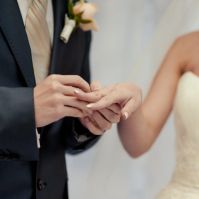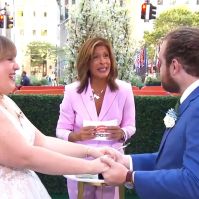 The status of marriages officiated by Universal Life Church ministers is well-established when both parties are citizens of the United States. To understand the legal issues regarding the marriage of a U.S. citizen to a non-citizen who is planning to immigrate, we will look at the laws that regulate such action. The immigration laws of the United States are complicated and not all marriages lead to green cards. It is important to note that marriage alone does not confer any immigration status to a foreign national. Of the pair, the U.S. Citizen must petition the Immigration and Citizenship Services for an immigrant visa on behalf of the partner.
The status of marriages officiated by Universal Life Church ministers is well-established when both parties are citizens of the United States. To understand the legal issues regarding the marriage of a U.S. citizen to a non-citizen who is planning to immigrate, we will look at the laws that regulate such action. The immigration laws of the United States are complicated and not all marriages lead to green cards. It is important to note that marriage alone does not confer any immigration status to a foreign national. Of the pair, the U.S. Citizen must petition the Immigration and Citizenship Services for an immigrant visa on behalf of the partner.
In order to obtain lawful permanent residence based on marriage to a U.S. Citizen, the marriage must be valid, which for immigration purposes, this is determined by federal immigration law rather than state laws. The complexity of immigration law and its intersection with State law may result in some marriages performed by ULC wedding officiants being valid for immigration purposes and others not. It would be prudent for bi-national couples to consult with an immigration attorney prior to marriage so as to ensure that their marriage will be considered valid. In general, U.S. immigration law will recognize marriages as valid if they are considered valid under the law of the state in which the marriage took place. If the marriage has taken place in another country it must be legal under the laws of that country. For information to perform a wedding with your online ordination, see our guide. In most states, a minister ordained by the Universal Life Church can lawfully marry couples as long as they follow the regulations for marriages and ministers prescribed by the particular state. As immigration law is federal and marriage is a constitutional right, State regulations cannot prevent bi-national couples from marrying. In most cases, a wedding ceremony officiated by a ULC minister will be valid for immigration purposes. Under the current federal laws, no same-sex marriages will be considered valid for immigration purposes even if they are valid under state law, regardless of who performed the ceremony. The U.S. Citizenship and Immigration Service is barred from recognizing these marriages as a result of the Defense of Marriage Act. As a result, thousands of gays and lesbians are prevented from obtaining green cards despite being lawfully married to a U.S. Citizen. The situation may change for some in the near future as the Supreme Court, in United States v. Windsor is expected to rule on the constitutionality of DOMA and whether or not the U.S. government can deny federal benefits to same-sex couples whose marriages are valid under State law. The decision is expected at the end of this month. Marriages between one or two transgendered individuals will be considered valid if their gender as decided by the state or state court is opposite that of the spouse. Marriages of first cousins will be considered valid if it is valid under the laws of the state or country where the marriage took place. Bigamous marriages, where one spouse is already married will not be valid for immigration purposes even if it is legal under the laws of the country in which it took place.
Armed with this information, you should at least have a general idea on the legal ramifications when you are asked to perform a wedding ceremony between a U.S. citizen and a non-citizen.
For any specific legal questions or for consultation, please contact Andre Olivie, Immigration Attorney.



